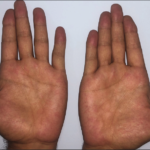Halitosis is the medical term for bad breath. Everyone gets bad breath from time to time — especially after eating garlic, onions or other strong foods. But bad breath that doesn’t go away (chronic halitosis) could mean you have an oral health issue or a condition that’s affecting another part of your body and its called Halitosis.
Causes of Halitosis
Tobacco: Tobacco products cause their own types of mouth odor. Additionally, they increase the chances of gum disease which can also cause bad breath.
Food: The breakdown of food particles stuck in the teeth can cause odors. Some foods such as onions and garlic can also cause bad breath. After they are digested, their breakdown products are carried in the blood to the lungs where they can affect the breath.
Dry mouth: Saliva naturally cleans the mouth. If the mouth is naturally dry or dry due to a specific disease, such as xerostomia, odors can build up.
Dental hygiene: Brushing and flossing ensure the removal of small particles of food that can build up and slowly break down, producing odor. A film of bacteria called plaque builds up if brushing is not regular. This plaque can irritate the gums and cause inflammation between the teeth and gums called periodontitis. Dentures that are not cleaned regularly or properly can also harbor bacteria that cause halitosis.
And in conclusion, The specific odor of breath can vary depending on the cause of the problem. It is best to ask a close friend or relative to gauge your mouth odor, as it can be difficult to assess it yourself. If no one is available, one way of checking the odor is to lick your wrist, leave it to dry, and then smell it. A bad smell on this area of the wrist is likely to suggest that you have halitosis. Always contact your healthcare provider for proper diagnosis and treatment.



